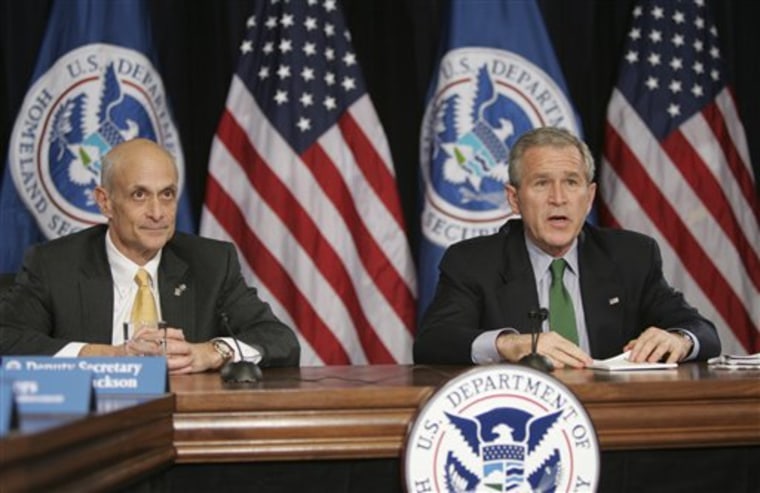The White House is attempting an awkward straddle as Congress debates resolutions critical of the Iraq war, determined to avoid a repudiation of President Bush, yet reluctant to lobby too aggressively for fear of triggering a Republican backlash.
Bush's "ability to sway votes on issues like this has been severely diminished," says Sen. Lindsey Graham, a South Carolina Republican and a supporter of the president's troop buildup. "I don't think people are going to cheerlead now."
At least a half-dozen Republican senators appear ready to vote for a nonbinding measure critical of Bush's decision to deploy an additional 21,500 troops. Sen. Arlen Specter, R-Pa., said he told the president after one recent White House meeting that he "didn't see the need for more troops. I raised my concerns, and he listened."
Some encourage full-court press
In the House, GOP leaders concede there will be defections next week when a vote is scheduled on a measure expressing disapproval of the troop increase.
It's a sign of the change in relations between congressional Republicans and the administration after nearly four years of war, the deaths of more than 3,000 U.S. military personnel and the midterm elections that gave Democrats control of the House and Senate.
In the past, the White House has been far more public in making its wishes known, as it did aggressively last fall when top officials lobbied hard to resist congressional efforts to impose strict limits on detainee interrogations. Even now, some Republicans say the president should weigh in more strenuously on Iraq.
"I've encouraged them to put the full-court press on," said Rep. Ray LaHood, R-Ill. "This is a big issue, and they have a big stake in the outcome."
Yet some other lawmakers and senior aides say public arm-twisting could spark a backlash.
Instead, the president has lobbied lawmakers in private. At a party retreat last week, Bush told about two-dozen Republican senators - some considering backing a bipartisan measure rejecting the troop increase - that the world was watching them. At a recent House gathering, Bush said he respected lawmakers' oversight rights on the war. He met with one group of skeptical House Republicans in the White House Situation Room, where they could safely air disagreements over classified material.
Breaking out Petraeus
Vice President Dick Cheney, who has often played the role of party disciplinarian on key votes, has generally refrained from speaking up at weekly closed-door Senate GOP lunches, according to senators in attendance.
Instead, the newly confirmed commander of U.S. troops in Iraq, Lt. Gen. David Petraeus, and National Security Adviser Stephen J. Hadley have taken the lead. Sen. George V. Voinovich, R-Ohio, a critic of the troop increase, said he spent 40 minutes talking with Petraeus about his concerns. Hadley was made available to House Republicans last month to hear their misgivings about the president's plan.
"This is a nonbinding resolution where people are trying to speak their minds on an issue, and it's appropriate to let them go ahead and work through it," said Tony Snow, the White House spokesman. "This is not something where the White House is in a position - or ought to be in a position - to try to tell people exactly how they ought to frame it."
The administration's legislative team has kept close tabs on Republican sentiment on the war, though, laboring to head off a bipartisan repudiation of Bush's policy.
Senate Republican leaders "know they don't want a rebuke of the president. They've let it be known what they wanted," said Don Stewart, a top aide to Sen. Mitch McConnell of Kentucky, the minority leader.
Some Democrats said they saw the fingerprints of the White House on the Iraq debate. Senate Majority Leader Harry Reid of Nevada charged that Republicans who voted this week to block swift action on the measure opposing the troop increase did so as a favor to Bush.
"Their stalling is helping the president, because the president, of course, is involved in this backroom negotiation," Reid said.
But Graham questioned how effective Bush was. "We're concerned about embarrassing the president, but right now members' concerns are more parochial," he said.
